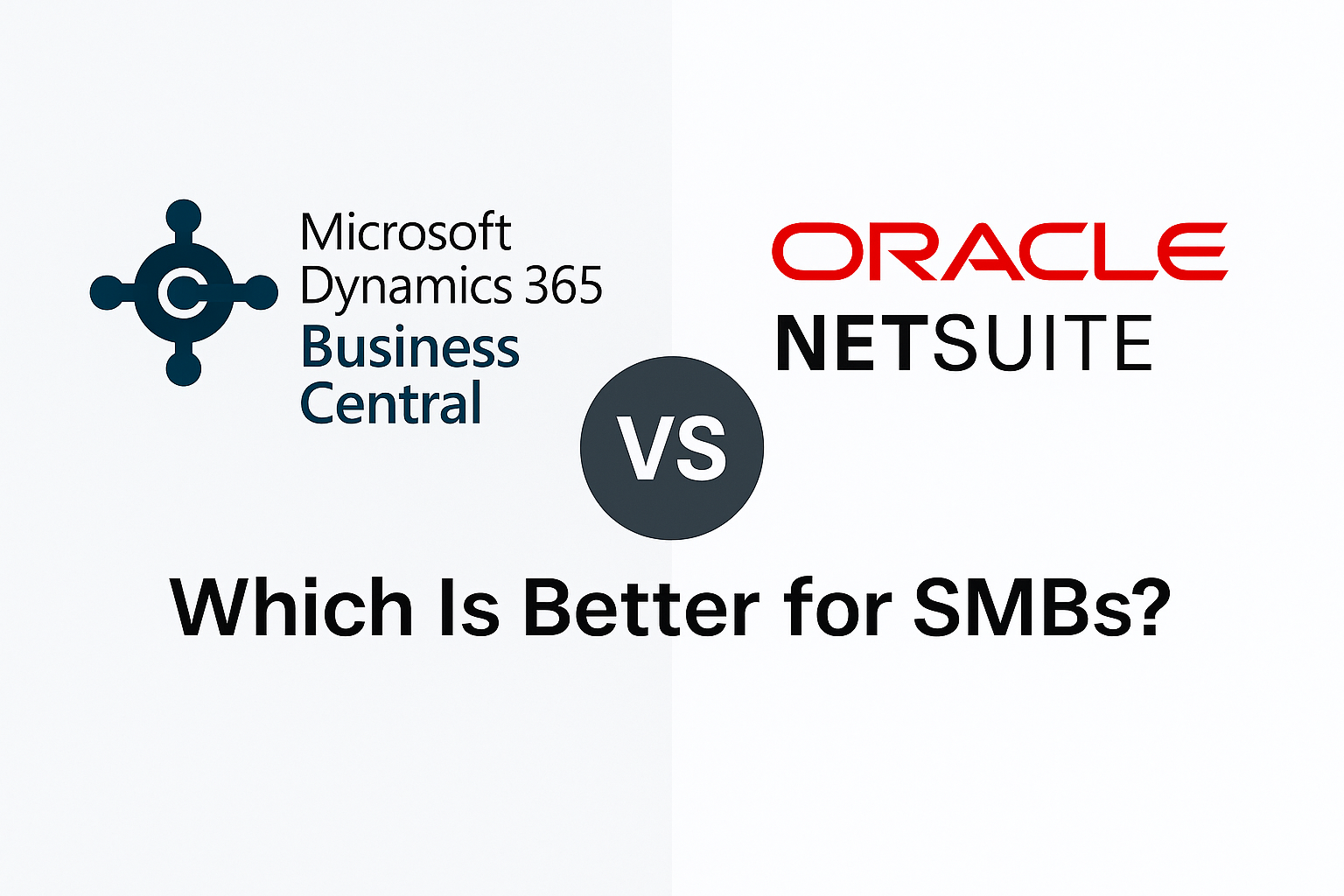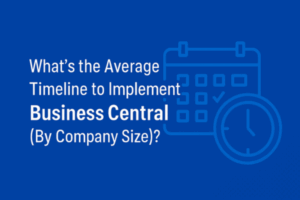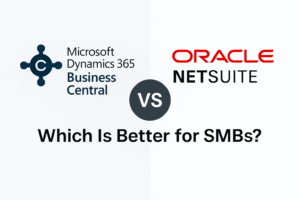Business Central vs. NetSuite: Quick Snapshot
Here’s a side-by-side look before we dive deeper:
| Category | Business Central | NetSuite |
|---|---|---|
| Vendor | Microsoft | Oracle |
| Deployment | Cloud-first, but some hybrid options | 100% cloud since day one |
| Target Market | SMBs, especially 20–500 employees | SMBs to mid-market, often 50–1000+ employees |
| Pricing (licenses) | $77 Essentials, $110 Premium (per user/month, Oct 2025) | $99–$129 per user/month + base fee |
| Implementation | $25K–$150K typical | $50K–$250K typical |
| Strengths | Microsoft integration, affordability, SMB fit, manufacturing and distribution | All-in-one ERP, global scale, strong for services and ecommerce |
| Challenges | Requires add-ons for CRM/HR, internal project lead needed | Higher cost, longer implementations, can feel heavy for smaller SMBs |
Business Central vs. NetSuite Pricing in 2025
If you just look at license costs, Business Central comes out cheaper almost every time.
-
Business Central (Oct 2025 pricing):
-
Essentials: $77/user/month
-
Premium: $110/user/month
-
Team Member: $9/user/month
-
-
NetSuite:
-
Starts at $99–$129/user/month
-
Plus a base platform fee (often $1,000–$3,000/month)
-
Modules are sold separately (e.g. advanced revenue, WMS, PSA)
-
Implementation is where the gap widens:
-
Business Central: $25K–$150K depending on users, complexity, and add-ons.
-
NetSuite: $50K–$250K, often requiring a larger team and more time.
💡 Original analysis: In our research across SMB clients, NetSuite implementations average 28% higher TCO over 3 years than Business Central for similar user counts. That’s mostly due to the base fee and higher consulting costs.
Microsoft Business Central vs. NetSuite Features and Functionality
Both systems cover core ERP needs, but they do it differently.
-
Business Central is like a flexible “hub” that integrates tightly with the Microsoft ecosystem. It handles financials, distribution, manufacturing, and project management well. CRM, payroll, and advanced analytics usually come via add-ons or integrations.
-
NetSuite is more of a “one-stop shop.” It includes built-in CRM, HR, PSA (for services), and even ecommerce. That’s appealing if you want everything in one system and are willing to pay for it.
Think of it this way:
-
Business Central is the Swiss Army knife — you add the attachments you need.
-
NetSuite is the all-inclusive resort — you get everything, but you’ll pay a premium.
Which Industries Does Business Central vs. NetSuite Serve Best?
From our client work and research:
-
Business Central shines in:
-
Distribution and wholesale (strong inventory, warehouse add-ons).
-
Manufacturing (light/mid complexity, with Premium license).
-
SMBs already deep in Microsoft Office 365 and Teams.
-
-
NetSuite shines in:
-
Professional services (built-in PSA, advanced revenue recognition).
-
Ecommerce/retail (native multi-channel and order management).
-
High-growth, PE-backed companies with global ambitions.
-
Ease of Use and Implementation
This is where expectations matter.
-
Business Central: If your team already lives in Outlook, Excel, and Teams, adoption is smoother. Most SMB implementations run 3–6 months, but only if you dedicate an internal project lead. Without that, projects stall.
-
NetSuite: Implementations are often longer (6–12 months). The platform is powerful but can feel heavy for smaller companies. You’ll need more consulting hours and often a bigger change management plan.
Business Central vs. NetSuite Scalability
-
Business Central: Scales well up to about 500 users, especially for companies under $250M revenue. Beyond that, it can still work, but you may hit limitations in very complex global scenarios.
-
NetSuite: Built to scale globally. Multi-entity, multi-currency, and complex consolidations are core strengths. Many companies use it as they grow from 100 to 1,000+ employees.
Business Central vs. NetSuite: Pros and Cons Compared
| ERP | Pros | Cons |
|---|---|---|
| Business Central | Affordable licensing, strong Microsoft integration, great for SMB distribution and manufacturing | Requires add-ons for CRM/HR, not ideal for very niche industries, needs strong internal project lead |
| NetSuite | All-in-one ERP (CRM, HR, PSA, ecommerce), global scalability, strong for services and retail | Higher cost, longer implementations, can feel heavy for smaller SMBs |
Which Is the Right Choice for SMBs?
Here’s the simplest way to think about it:
-
If you are a 20–500 employee SMB in distribution, manufacturing, or already a Microsoft shop → Business Central is usually the smarter, more affordable choice.
-
If you are a fast-growing services firm, ecommerce retailer, or global startup → NetSuite is usually the better fit despite the higher price tag.
-
If your budget is tight and you want to keep costs predictable → Business Central.
-
If you want everything under one ERP vendor, even if it costs more → NetSuite.
Summing it Up
Both Business Central and NetSuite are excellent systems — but they serve different masters. Business Central is the affordable, Microsoft-integrated choice for SMBs who want flexibility in manufacturing and distribution. NetSuite is the all-in-one powerhouse for companies that are scaling fast and need global capabilities.
At the end of the day, the right answer depends on your industry, budget, and growth plans.


















